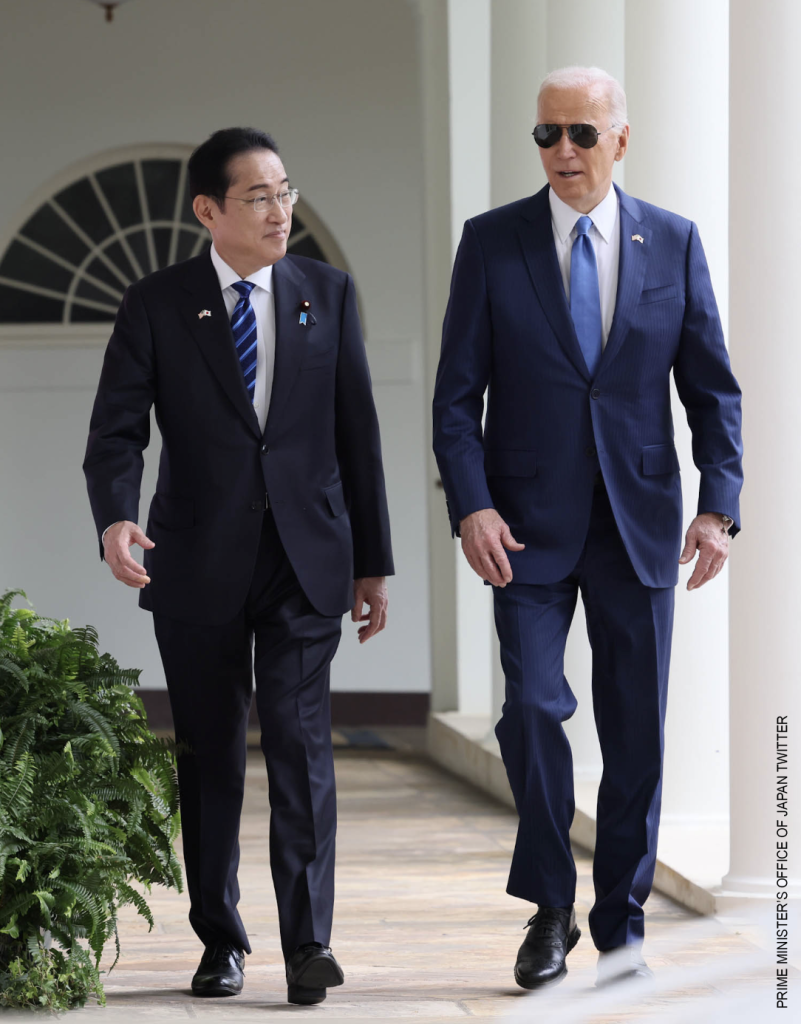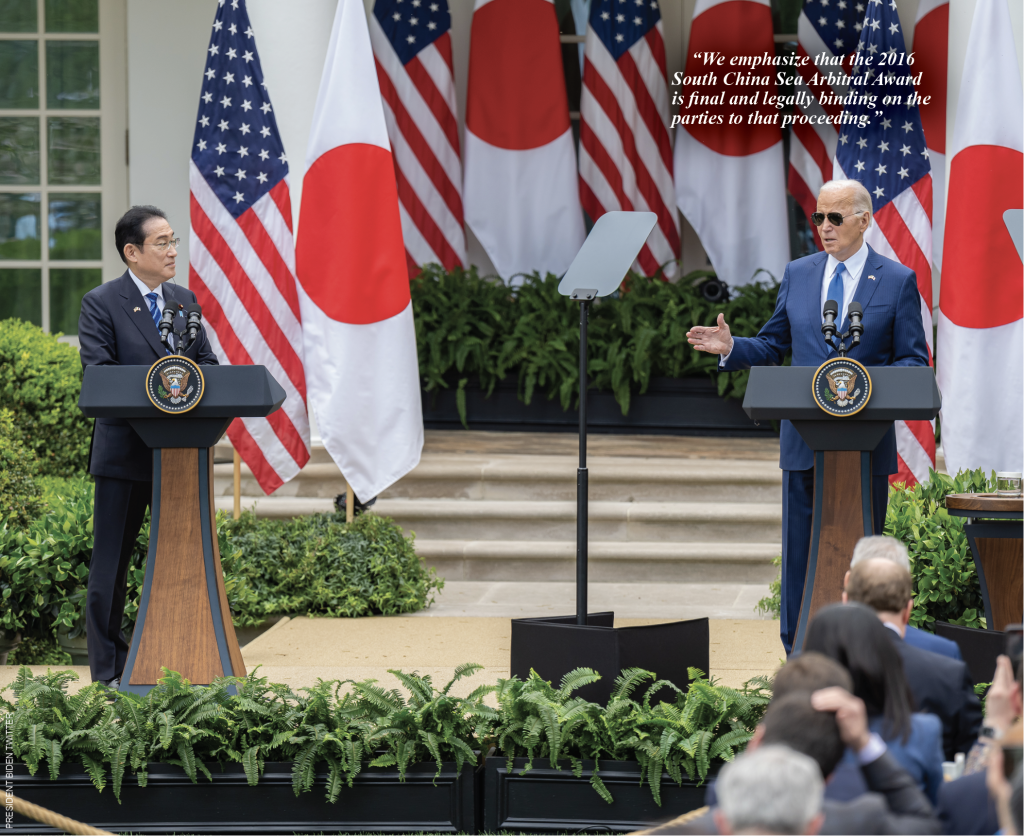Joint Statement
By US PRESIDENT JOSEPH BIDEN
AND JAPAN PRIME MINISTER FUMIO KISHIDA
April 10, 2024

Over the course of the last three years, the U.S.-Japan Alliance has reached unprecedented heights. We arrived at this historic moment because our nations, individually and together, took courageous steps to strengthen our collective capacity in ways that would have seemed impossible just a few years ago.
Today, we, President Joseph R. Biden, Jr. and Prime Minister Kishida Fumio, celebrate this new era of U.S.-Japan strategic cooperation during the Prime Minister’s Official Visit and State Dinner in Washington, D.C.—and pledge that the United States and Japan will continue our tireless work, together and with other partners, to realize a free and open Indo-Pacific and world.
A new era of cooperation
In this new era of U.S.-Japan cooperation, we recognize that global events affect the security and stability of the Indo-Pacific, and that developments in our shared region reverberate around the world. We are therefore working together, across all domains and at all levels, to build a global partnership that is fit for purpose to address the complex, interconnected challenges of today and tomorrow for the benefit of our two countries and the world.
As our Alliance cooperation reaches new heights, we are expanding our engagement to reflect the global nature of our partnership.
At the core of our cooperation is a shared commitment to work with like-minded partners and multilateral institutions to address common challenges and to ensure a world that is free, open, connected, resilient, and secure.
These joint efforts are based on our shared fundamental respect for international law, including the protection and promotion of human rights and dignity, the sovereignty and territorial integrity of all states, and the prohibition on acquisition of territory by force.
Our purpose as partners is to uphold and bolster the free and open international order based on the rule of law that has allowed so many nations to develop and prosper, and to ensure our Alliance is equipped to tackle the challenges of the 21st century.
Strategic initiatives
To advance our global partnership, today we announce several new strategic initiatives to strengthen our defense and security cooperation; reach new frontiers in space; drive technology innovation; bolster economic security; accelerate climate action; partner on global diplomacy and development; and fortify the ties between our peoples.
Through our global partnership, we are also synchronizing our strategies, and our two nations have never been more united as we work together to address the most pressing challenges and opportunities of the future.
Strengthening our defense and security cooperation
The core of our global partnership is our bilateral defense and security cooperation under the Treaty of Mutual Cooperation and Security, which is stronger than ever.
We affirm that our Alliance remains the cornerstone of peace, security, and prosperity in the Indo-Pacific. President Biden reiterated the unwavering commitment of the United States to the defense of Japan under Article V of the Treaty, using its full range of capabilities, including nuclear capabilities.
Prime Minister Kishida reaffirmed Japan’s unwavering commitment to fundamentally reinforce its own defense capabilities and roles, and to enhance its close coordination with the United States under the Treaty.
Senkaku islands
President Biden also reaffirmed that Article V applies to the Senkaku Islands. We reiterated our strong opposition to any attempts by the People’s Republic of China (PRC) to unilaterally change the status quo by force or coercion in the East China Sea, including through actions that seek to undermine Japan’s longstanding and peaceful administration of the Senkaku Islands.
We welcome the progress in optimizing Alliance force posture in areas including the Southwestern Islands to strengthen U.S.-Japan deterrence and response capabilities, and we confirm the importance of further advancing this initiative.
Enhancing Japan’s defense capabilities
The United States welcomes the steps Japan is taking to fundamentally enhance its defense capabilities, including its plans to increase the budget for its defense capabilities and complementary initiatives to 2% of GDP in Japanese Fiscal Year (JFY) 2027 in accordance with Japan’s National Security Strategy, its decision to possess counterstrike capabilities, and its plans to stand up the Japan Self-Defense Forces (JSDF) Joint Operations Command to enhance command and control of the JSDF.
Together, these initiatives elevate our defense ties to unprecedented levels and launch a new era of U.S.-Japan security cooperation, strengthening our Alliance and contributing to stability in the Indo-Pacific.
New strategic initiatives

Today, we announce several new strategic initiatives to further advance our Alliance. Recognizing the speed at which regional security challenges evolve and to ensure our bilateral Alliance structures meet these critical changes, we announce our intention to bilaterally upgrade our respective command and control frameworks to enable seamless integration of operations and capabilities and allow for greater interoperability and planning between U.S. and Japanese forces in peacetime and during contingencies.
More effective U.S.-Japan Alliance command and control will strengthen deterrence and promote a free and open Indo-Pacific in the face of pressing regional security challenges. We call on our respective defense and foreign ministries to develop this new relationship through the Security Consultative Committee (our security “2+2”).
In support of this vision, we also reaffirm our goal to deepen Intelligence, Surveillance, and Reconnaissance cooperation and Alliance information sharing capabilities, including through the Bilateral Information Analysis Cell.
We will also continue to implement efforts to strengthen our Alliance force posture, build high-end base capabilities, and increase preparedness that are necessary to deter and defend against threats.
Japan’s counterstrike capabilities
We resolve to deepen bilateral cooperation toward the effective development and employment of Japan’s suite of counterstrike capabilities, including the provision of U.S. materiel and technological support to enhance Japan’s indigenous stand-off programs.
The United States expressed its commitment to start the training pipeline and ship modifications for Japan to acquire operational capability of the Tomahawk Land Attack Missile (TLAM) system. We also reaffirmed our pursuit of a Glide Phase Interceptor (GPI) cooperative development program to counter high-end, regional hypersonic threats.
As our countries strengthen our bilateral ties, we will continue to build our relationships with like-minded partners in the region.
Air defense by US, Japan and Australia
Today, we announce our vision to cooperate on a networked air defense architecture among the United States, Japan, and Australia to counter growing air and missile threats.
Recognizing Japan’s strengths and the close bilateral defense partnerships with the AUKUS countries, AUKUS partners – Australia, the United Kingdom, and the United States – are considering cooperation with Japan on AUKUS Pillar II advanced capability projects. Continuing the momentum from the Camp David Summit, we welcome progress on establishing an annual multidomain exercise between the United States, Japan, and the Republic of Korea (ROK).
Trilateral exercises
Recognizing the commitments made in the Atlantic Declaration and the Hiroshima Accord, and as the Indo-Pacific and Euro-Atlantic regions become ever more interlinked, we welcome the announcement of regular U.S.-Japan-UK trilateral exercises, beginning in 2025, as we enhance our shared and enduring security.
Building on the announcement at the Australia Official Visit in October to pursue trilateral cooperation with Japan on unmanned aerial systems, we are exploring cooperative opportunities in the rapidly emerging field of collaborative combat aircraft and autonomy.
Revision of Three Principles
The United States welcomes Japan’s revision of the Three Principles on the Transfer of Defense Equipment and Technology and its Implementation Guidelines, which bolsters cooperation through joint development and production to enhance our deterrence capabilities in the region.

Missiles, ships, aircraft
To leverage our respective industrial bases to meet the demand for critical capabilities and maintain readiness over the long term, we will convene a Forum on Defense Industrial Cooperation, Acquisition and Sustainment (DICAS) co-led by the U.S. Department of Defense and Japan’s Ministry of Defense to identify priority areas for partnering U.S. and Japanese industry, including co-development and co-production of missiles and co-sustainment of forward-deployed U.S. Navy ships and U.S. Air Force aircraft, inclu2ding fourth generation fighters, at Japanese commercial facilities, in coordination with relevant ministries.
This forum, in conjunction with our existing Defense Science and Technology Cooperation Group, will better integrate and align our defense industrial policy, acquisition, and science and technology ecosystems.
The DICAS will provide updates on progress to the foreign and defense ministers in the security “2+2.” We also commit to establishing a working group to explore opportunities for future fighter pilot training and readiness, including AI and advanced simulators, and co-development and co-production of cutting-edge technologies such as common jet trainers to maintain combat-ready next-generation fighter airpower.
Extended deterrence
We reaffirm the critical importance of continuing to enhance U.S. extended deterrence, bolstered by Japan’s defense capabilities, and will further strengthen bilateral cooperation. In this regard, we call on our respective foreign and defense ministers to hold in-depth discussions on extended deterrence on the occasion of the next security “2+2” meeting.
We continue to deepen our cooperation on information and cyber security to ensure that our Alliance stays ahead of growing cyber threats and builds resilience in the information and communication technology domain. We also plan on enhancing our cooperation on the protection of critical infrastructure.
Disaster relief hub in Japan
Recognizing the importance of rapidly responding to frequent and severe climate change-related and other natural disasters, we plan to explore cooperation on the establishment of a humanitarian assistance and disaster relief hub in Japan.
In order to maintain deterrence and mitigate impact on local communities, we are firmly committed to the steady implementation of the realignment of U.S. forces in Japan in accordance with Okinawa Consolidation Plan, including the construction of the Futenma Replacement Facility at Henoko as the only solution that avoids the continued use of Marine Corps Air Station Futenma.
